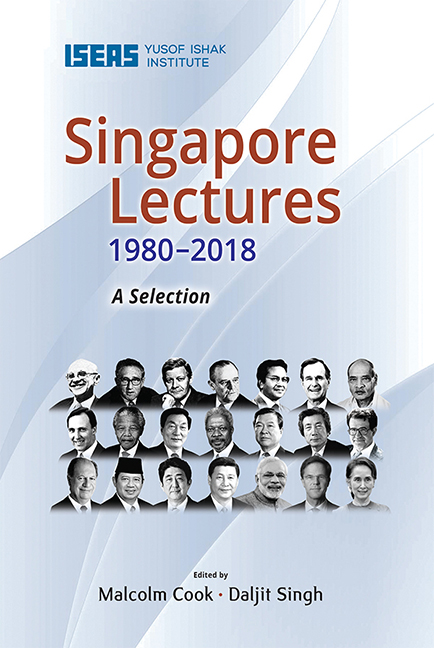Book contents
- Frontmatter
- Contents
- Introduction
- 1 The Invisible Hand in Economics and Politics
- 2 American Foreign Policy: A Global View
- 3 The Soviet Union: Challenges and Responses as Seen from the European Point of View
- 4 Trends in the International Financial System
- 5 Regionalism, Globalism and Spheres of Influence: ASEAN and the Challenge of Change into the 21st Century
- 6 US Policy in the Asia-Pacific Region: Meeting the Challenges of the Post-Cold War Era
- 7 India and the Asia-Pacific: Forging a New Relationship
- 8 Australia, Asia and the New Regionalism
- 9 South and Southern Africa into the Next Century
- 10 China and Asia in the New Century
- 11 Global Values: The United Nations and the Rule of Law in the 21st Century
- 12 Peace on the Korean Peninsula and East Asia
- 13 Japan and ASEAN in East Asia: A Sincere and Open Partnership
- 14 EU and Asia: Sharing Diversity in an Inter-regional Partnership
- 15 Global Challenges in the 21st Century: A View from Chile
- 16 Indonesia: The Challenge of Change
- 17 Japan and ASEAN, Always in Tandem: Towards a More Advantageous Win-Win Relationship through My “Three Arrows”
- 18 Forging a Strong Partnership to Enhance Prosperity of Asia
- 19 India’s Singapore Story
- 20 The Netherlands, Singapore, Our Regions, Our World: Connecting Our Common Future
- 21 Democratic Transition in Myanmar: Challenges and the Way Forward
- The Singapore Lecture Series
- The Editors
3 - The Soviet Union: Challenges and Responses as Seen from the European Point of View
Published online by Cambridge University Press: 09 October 2021
- Frontmatter
- Contents
- Introduction
- 1 The Invisible Hand in Economics and Politics
- 2 American Foreign Policy: A Global View
- 3 The Soviet Union: Challenges and Responses as Seen from the European Point of View
- 4 Trends in the International Financial System
- 5 Regionalism, Globalism and Spheres of Influence: ASEAN and the Challenge of Change into the 21st Century
- 6 US Policy in the Asia-Pacific Region: Meeting the Challenges of the Post-Cold War Era
- 7 India and the Asia-Pacific: Forging a New Relationship
- 8 Australia, Asia and the New Regionalism
- 9 South and Southern Africa into the Next Century
- 10 China and Asia in the New Century
- 11 Global Values: The United Nations and the Rule of Law in the 21st Century
- 12 Peace on the Korean Peninsula and East Asia
- 13 Japan and ASEAN in East Asia: A Sincere and Open Partnership
- 14 EU and Asia: Sharing Diversity in an Inter-regional Partnership
- 15 Global Challenges in the 21st Century: A View from Chile
- 16 Indonesia: The Challenge of Change
- 17 Japan and ASEAN, Always in Tandem: Towards a More Advantageous Win-Win Relationship through My “Three Arrows”
- 18 Forging a Strong Partnership to Enhance Prosperity of Asia
- 19 India’s Singapore Story
- 20 The Netherlands, Singapore, Our Regions, Our World: Connecting Our Common Future
- 21 Democratic Transition in Myanmar: Challenges and the Way Forward
- The Singapore Lecture Series
- The Editors
Summary
On 10 November 1983, the former Chancellor of the Federal Republic of Germany Helmut Schmidt gave the 4th Singapore Lecture after being welcomed by Minister for Culture S. Dhanabalan. Mr Schmidt was the first German and second European former political leader to give a Singapore lecture. Former President of France Valéry Giscard d’Estaing gave the 3rd Singapore Lecture in 1982. Mr Schmidt's lecture is a very erudite speech setting out the challenge of the Soviet Union to Western Europe and the wider world. Six years before the fall of the Berlin Wall, it serves as an eloquent reminder of the nature of the global Cold War system.
Mr Minister, Ladies and Gentlemen,
Thank you, in the first place for your kind invitation, and secondly, Mr Minister, for your kind words of introduction.
I have been told that in former years my friends, Valery Giscard d’Estaing and Henry Kissinger, have given talks at this occasion. And this reminds me of a little story which I related to Prime Minister Lee Kuan Yew. It is a true story. Earlier on this autumn, some old friends met in the house of former President Gerald Ford in Colorado, USA: Valéry Giscard, Henry Kissinger, Jerry Ford himself, Jim Callaghan from Britain, Malcolm Fraser from Australia, and myself—all of us “elder statesmen”, so to speak.
And one evening, at the end of a private conversation, Jerry Ford summed it all up by saying, “Well, obviously, we ought to agree that the world was much better run in our time of office.” Mr Lee Kuan Yew said over lunch, “And this may even have been true.”
I think Jerry Ford would have said the same thing if one more gentleman had been present, who also was out of office in the mean time. I am talking of the former British Foreign Secretary, Lord Carrington, whom I admire very much. He, I think, was the world's outstanding Foreign Secretary in the late seventies and early eighties. Earlier on this year, he gave a marvellous speech, the Alistair Buchan Memorial Lecture, in London, where he not only criticized profoundly the present political, economic, military upheaval within the Western Alliance, but beyond that demanded what he called “a positive political strategy” in dealing with the Soviet Union.
- Type
- Chapter
- Information
- Singapore Lectures 1980-2018 , pp. 37 - 56Publisher: ISEAS–Yusof Ishak InstitutePrint publication year: 2020

